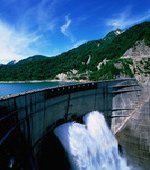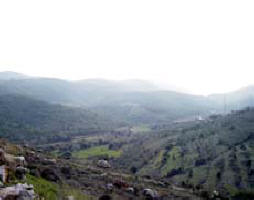 New Publication: Water Challenges and Cooperative Response In the Middle East and North Africa
New Publication: Water Challenges and Cooperative Response In the Middle East and North Africa
The Stimson Center is pleased to announce the release of a new report, Water Challenges and Cooperative Response in the Middle East and North Africa.
Home to more than 7 percent of the world’s population, the Middle East and North Africa (MENA) region is endowed with less than 1.5 percent of the world’s renewable freshwater. Rapid urbanization and population growth, increased water withdrawals for agriculture, municipal uses, and energy production, along with the proliferation of energy-intensive lifestyles, are placing an unprecedented strain on the MENA region’s limited water resources.
Water experts typically consider annual availability of less than 1,700 m3 per capita to pose a significant constraint on socio-economic development. Collectively, the MENA countries’ annual renewable water resources now amount to under 1,300 m3 per capita, making the region the most water stressed in the world. As populations rise, demand mounts, and global climate change looms, per capita water availability in the region is projected to drop in half by mid-century.
Meeting these challenges will require both enhanced policy innovation and reform within the MENA countries and increased cooperation, data sharing, knowledge and capacity building between them.
On May 29-31, 2012, the Stimson Center convened a workshop on Water Challenges and Cooperative Response in the Middle East and North Africa as a component of the 2012 US-Islamic World Forum held in Doha, Qatar. Participants included scientists, academics, policy analysts, and practitioners from several MENA countries, as well as US and European experts.
The interdisciplinary working group identified the principal water resource issues facing decision makers and stakeholders in the region, assessed the MENA states’ existing governance capacities and resources to address these emerging pressures, and recommended priority areas and approaches for advancing international and inter-sectoral cooperation and for identifying and strengthening intellectual and technical resources, tools, lessons, and best practices that could be shared, applied, or adapted across the region.This report provides a brief overview of available water resources in the MENA region. It then discusses the salient socio-economic and environmental stresses and trends that will drive and condition water supply and demand over the coming decades. Next, the report sketches prevailing water management approaches that are being developed or might be brought to bear.
With this foundation in place, the report then seeks to illuminate the water governance policy options and obstacles confronting the region by examining three case studies: the Tigris-Euphrates basin, the Nile basin, and a side-by-side consideration of water stewardship in Yemen and Oman. Finally, the report concludes by presenting some recommendations suggesting strategies for the MENA countries to build their water management capabilities and bolster collaborative alternatives to managing scarce water resources at both the domestic and regional levels.The full report is freely available at: http://www.brookings.edu/research/papers/2012/11/water-security-middle-east-iwf
Read more about the 2012 U.S.-Islamic World Forum publications »
| Contact information |
David Michel, Director, Environmental Security The Stimson Center | 1111 19th Street NW, Twelfth Floor | Washington, DC 20036 USA (Authors: David Michel, Amit Pandya, Syed Iqbal Hasnain, Russell Sticklor and Sreya Panuganti)
(email: dmichel@stimson.org) |
|---|---|
| News type | Inbrief |
| File link |
http://www.brookings.edu/research/papers/2012/11/water-security-middle-east-iwf |
| File link local |
|
| Source of information | Environmental Security The Stimson Center |
| Keyword(s) | data sharing, water security, water availability, climate change, water withdrawals, energy production, water stress |
| Subject(s) | AGRICULTURE , ENERGY , FINANCE-ECONOMY , HYDRAULICS - HYDROLOGY , NATURAL MEDIUM , POLICY-WATER POLICY AND WATER MANAGEMENT , RISKS AND CLIMATOLOGY , WATER DEMAND |
| Relation | http://www.brookings.edu/~/media/Research/Files/Papers/2012/11/iwf%20papers/Water%20web.pdf |
| Geographical coverage | n/a |
| News date | 16/11/2012 |
| Working language(s) | ENGLISH |
 you are not logged in
you are not logged in





